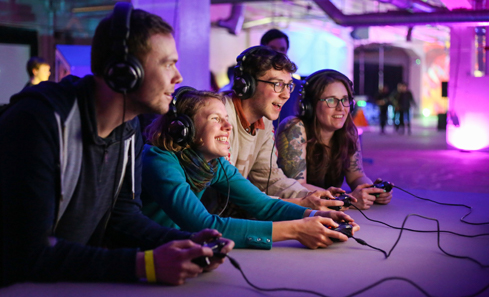
Can video games help young people talk about mental health? Dundee-based video game designers Biome Collective certainly think so, and they're headed to London Design Biennale with a new interactive tool that aims to do just that. We took a closer look...
One of Scotland’s most pioneering video game designers, Biome Collective have been selected to represent Dundee at London Design Biennale 2018 (4 - 23 September), the first time a city has been invited to contribute to the event alongside nations. Striving to explore big questions and ideas around sustainability, migration, pollution and social equality, this year’s theme is Emotional States.
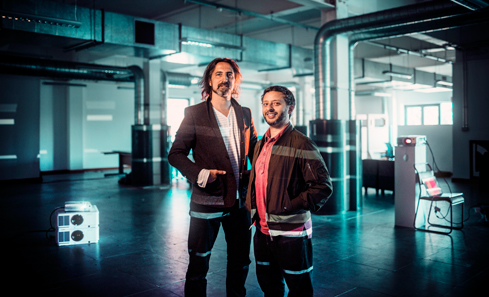
Drawing on Dundee’s rich heritage of video game design, Biome Collective (led by Malath Abbas and Tom deMajo, above), responded to the theme by asking “What can video games do to help young people start talking about their mental health?” Working with youth organisations and health services in Dundee, they developed an immersive interactive installation called Shpeel, a misspelling of the word “spiel”, meaning either “to speak” or “to play”.
Working with Biome Collective, we wanted to develop a tool - a conversation starter - that would enable a young person to describe exactly how they’re feeling without words.- Laura Cooney, The Corner
“We’ve designed a totally immersive experience that will allow people to share their emotional state in a non-verbal way," explains Malath Abbas, video game developer and one of Biome Collective's co-founders. "Using gaming techniques and 360-degree sound and interactive animation, visitors will be able to transform the whole atmosphere of the gallery space – the colour, sound and objects that enter it – to create an ‘emotional avatar’ which they can share with others and start a conversation about how they feel.
"It allows them to describe the nuances of how they’re feeling without words and to share that emotion visually with others. It’s a place for quiet conversation."
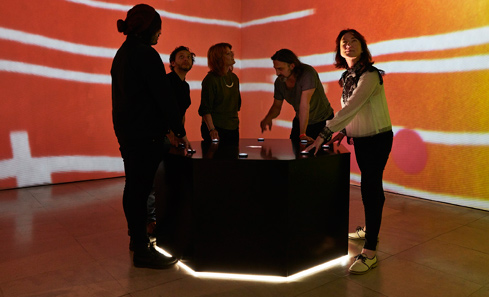
The project started in May 2018 with a gathering of Dundee-based designers, mental health professionals, campaigners and clinicians who came together to give context to Scotland’s growing mental health crisis. Participants included Scottish Association of Mental Health (SAMH), Brothers in Arms, a project dedicated to preventing male suicide, and counsellors and practitioners from local youth organisations. The project was then further developed with Dundee youth collective Hot Chocolate Trust, and The Corner, an NHS drop-in service for young people based in the city centre.
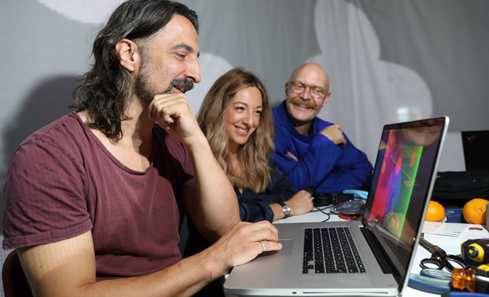
"Though the stigma around mental health is being reduced, people still find it difficult to find the words to talk about it," says Laura Cooney, Community Learning and Development Worker for The Corner. "The young people that come to us often don’t have the language to describe how they feel. This can be really frustrating for them. Working with Biome Collective, we wanted to develop a tool – a conversation starter – that would enable any young person we work with to describe exactly how they’re feeling without words.”
Mental health is a major challenge for Dundee. The city has the fourth highest rate of unemployment in the UK, and some of the highest levels of deprivation in Scotland, both of which have been shown to have negative impacts on mental health. Young people especially are increasingly experiencing mental health issues, the most common illnesses being anxiety and depression. Mental health is also a key issue for the Scottish Government’s themed Year of Young People 2018.
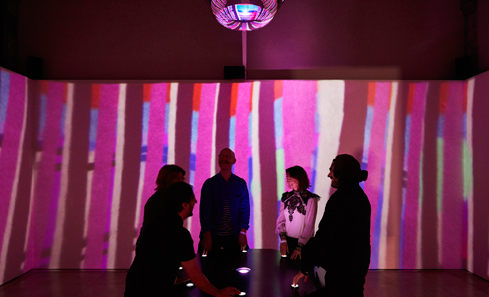
A highlight of the global design calendar, London Design Biennale sees 40 of the world’s most exciting and ambitious designers, innovators and curators gather to show how design impacts our very being and every aspect of our lives.
Dundee was named the UK’s first UNESCO City of Design in 2014. Since then the city has made a repeated public commitment to use design to transform the lives of its citizens. Dundee’s entry to London Design Biennale 2018 is produced by Tilde Arts in partnership with Creative Dundee. The project is supported by Creative Scotland, UNESCO City of Design Dundee, Abertay University, and University of Dundee.
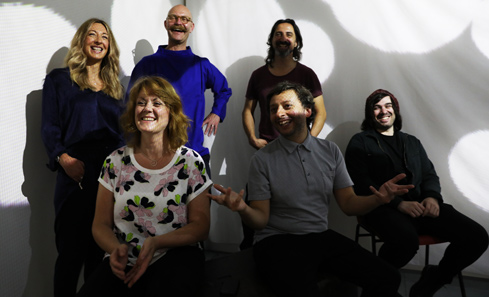
Siôn Parkinson of Tilde Arts, the project’s curator and former producer of Dundee Design Festival in 2016 and 2017, said: “September is an important month for design in Dundee, and we’re thrilled to be showcasing the best of our city’s creative talent at London Design Biennale in the same month as the inauguration of V&A Dundee. Bringing designers together with mental health professionals around the subject of mental illness seems like a meaningful and timely response to this year’s theme of Emotional States.
"We’re excited how Biome Collective’s installation at Somerset House might be developed in the future, say, by using virtual reality as a therapeutic tool. This could allow practitioners and counsellors an amazing visual insight in to how people are feeling, and a creative way for young people to take the lead on the conversation around their mental health.”
Clive Gillman, Director of Creative Industries, Creative Scotland, said: “Dundee’s presence at the London Design Biennale is not only a testament to the city’s success as being named the first UNESCO City of Design in the UK, it is also a recognition of the special way in which design is understood and applied in this lively part of Scotland. The strengths of the city in being at the heart of computer games design in the UK are widely acknowledged, but it also has less well-known strengths in the areas of design for healthcare and service design, and this collaboration will see all these elements brought together in a powerful and immersive presentation.
"The collaboration of all these partners, drawing on their networks and moving between disciplines, is a mark of city that understands how design can influence and effect social change.”
Dundee, the UK’s first and only UNESCO City of Design, is one of only a handful of cities contributing to the event alongside nations such as Australia, Brazil, China, Guatemala, India, Hong Kong, Mongolia, Saudi Arabia and USA. The event expects to welcome an audience of 30,000 ticketed visitors and up to 250,000 public throughout the nine days.
This project was supported by National Lottery funding through our Open Project Fund.
Photo credits: Erika Stevenson, Ross Fraser Maclean, Ed Reeve